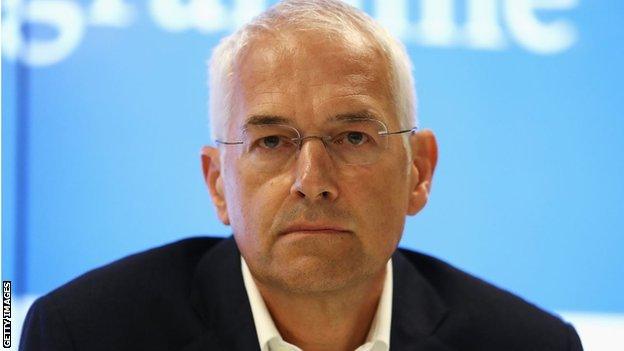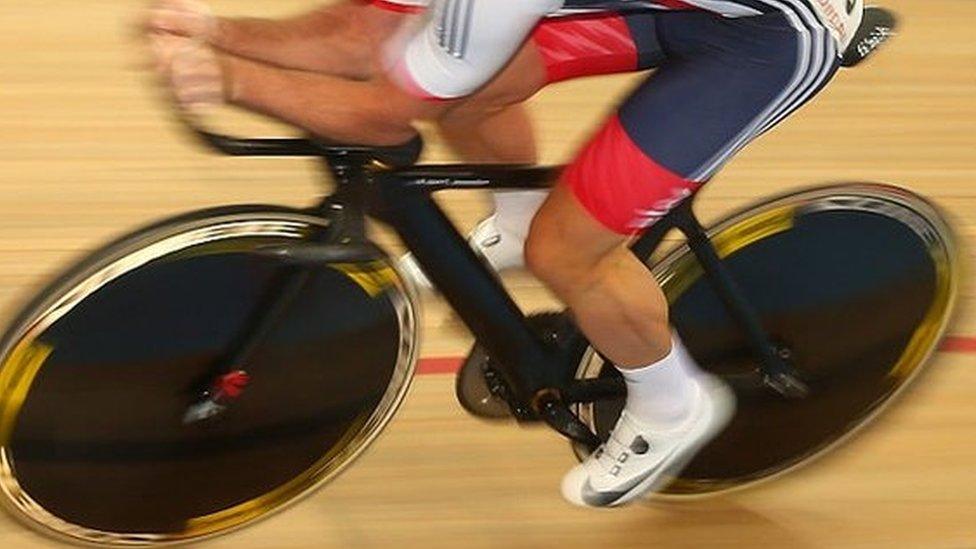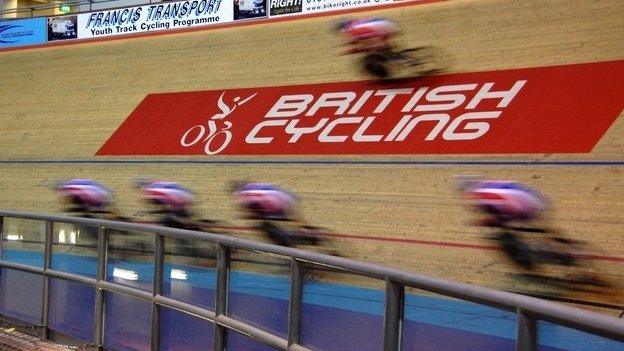Jonathan Browning: British Cycling chairman to stand down from role
- Published

Jonathan Browning was only appointed as chairman of British Cycling after Bob Howden stepped down in February
Jonathan Browning is standing down as chairman of British Cycling after just nine months in the job.
The former motor industry executive has also withdrawn his candidacy for the role of independent chair of the crisis-hit governing body.
Browning had been forced to reapply for his unpaid position to comply with new governance reforms.
Earlier this year, Browning apologised for "failings" after a series of bullying and doping scandals.
But Sport England had threatened to withdraw crucial funding unless British Cycling had an overhaul of its leadership.
"I have a passion to see through the transformation that we started, and have been encouraged by others to continue this work, which is why I put myself forward as a candidate for the role of independent chair," Browning said.
"However as I went through the process, it became clearer to me that British Cycling would benefit from a new leader to see it through the next stage of its development, particularly as British Cycling reshapes its relationships with its public funding partners."
Browning has overseen a raft of reforms and new appointments in recent months as one of British sport's most successful and best-funded governing bodies tried to recover from the worst crisis in its history.
'Cycling report uncomfortable reading'
However, having become a board director of British Cycling in April 2014, he has also faced criticism for his role in the handling of Jess Varnish's allegations of bullying and sexism.
The former sprinter had demanded the entire board step down after a damning independent report in June criticised the governance at British Cycling.
Browning will now resume his previous role as a non-executive director - the latest casualty of a saga that also contributed to former British Cycling chairman Brian Cookson being deposed as president of the UCI this summer.
However, Culture, Media and Sport select committee chairman Damian Collins MP said he should leave the organisation entirely.
"I'm pleased that Jonathan Browning is standing down," Collins told BBC Sport.
"Given the manifest failings of the old board of British Cycling there needs to be a complete break with the past and a completely new board. That should mean that neither Jonathan Browning nor Bob Howden should serve in the new board."
Manchester-based British Cycling will announce a new chair later this month as it prepares for yet more change after appointing a new chief executive and performance director in recent months. Five members of its board are preparing to step down.
However, BBC Sport understands that president Bob Howden - who Browning replaced as chairman - intends to stand for a new three-year term, despite a heavily criticised appearance in front of the DCMS Select Committee earlier this year.
Why he is stepping down - Browning's statement
"When I stepped into the role of chair in February, British Cycling was in the depths of a crisis, facing severe reputational damage and there was an absence of strong, visible leadership," said Browning.
"It was clear to me that we needed to very quickly stabilise the organisation and put in place a comprehensive plan to rapidly introduce major changes to the World Class Programme and to our leadership, operations and governance which were in need of immediate reform and repair.
"Over the past nine months, we have done exactly that. The efforts of so many across British Cycling - including both staff and riders - have resulted in: a comprehensive set of plans to address every recommendation within the Cycling Independent Review; approval for all the changes required for British Cycling to comply with the Code for Sports Governance; funding secured from UK Sport and Sport England for the Tokyo Olympic cycle; the implementation of a new medical services staff and structure; new grievance, whistleblowing and athlete representation processes; and the commissioning and implementation of recommendations from an external financial audit.
"On top of all this, and perhaps most critically, we have appointed strong new leaders including Julie Harrington, our chief executive officer, and Stephen Park, our performance director.
"When I look back over the period that I have been chair, I am immensely proud of what has been achieved and feel confident about the position that British Cycling is now in. Despite coming a long way, there is still more to do.
"I remain as committed as ever to ensuring that British Cycling continues to move in the right direction and at a pace faster than any other national governing body. The new chair can be assured of my continuing support in this endeavour."
British Cycling addressing shortcomings - Browning
What has changed at British Cycling?
April 2016: Technical director Shane Sutton quit and was later replaced by British Sailing performance director Stephen Park.
October 2016: Chief executive Ian Drake announced his resignation. Julie Harrington came in for Drake from the Football Association.
February 2017: Bob Howden stepped down as chairman - though remained the organisation's president - and was succeeded by former Vauxhall chief Jonathan Browning.
March 2017: A 39-point action plan was announced, including a new code of conduct, bringing the elite programme under more central control, plus greater focus on athlete and staff development.
June 2017: Plans were outlined for an overhaul of its medical services for athletes after it was scrutinised as part of an anti-doping investigation into a mystery medical package for Team Sky cyclist Sir Bradley Wiggins in 2011.
July 2017: British Cycling's National Council agreed to governance reforms at an emergency meeting so that the organisation could comply with new UK Sport directives setting standards for sport governance.
November 2017: Jonathan Browning stood down as chairman of British Cycling after less than a year in the job.
- Published14 June 2017

- Published2 March 2017

- Published21 February 2017

- Published1 February 2017